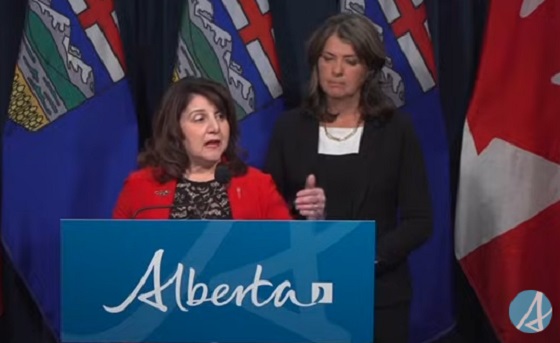Alberta
Alberta joins provincial opposition to federal Clean Fuel Regulations gas tax

Alberta joins provinces opposing federal regulations: Minister Schulz
Minister of Environment and Protected Areas Rebecca Schulz sent a letter to federal Minister of Environment and Climate Change Steven Guilbeault on the upcoming Clean Fuel Regulations:
“Today, I sent a letter to Minister Steven Guilbeault informing him that the Government of Alberta is joining the Government of Saskatchewan and the Atlantic provinces in calling on the federal government to immediately halt the implementation of the federal Clean Fuel Regulations on July 1.
“The federal Clean Fuel Regulations will harm provincial economies in Alberta, Saskatchewan and Atlantic Canada. Combined with the federal government’s carbon tax increase, higher gasoline and diesel costs are expected, putting added cost pressures on other goods and services across the country.
“Now is not the time to drive up prices at the pump and increase expenses for vulnerable households, businesses and industries. Families and businesses cannot continue to afford reckless cost and tax increases imposed by the federal government.
“Alberta has released an Emissions Reduction and Energy Development Plan which is our best path to enhancing our position as a global leader in emissions reductions, clean technology and innovation, and sustainable resource development. It includes a realistic aspiration to have a carbon-neutral economy by 2050, without compromising the affordable, reliable and secure energy that we all rely on.
“What we need now is a concrete plan that will help move us forward in realistic and innovative ways. The federal government needs to stop moving ahead with their costly plans until a path forward can be found that supports all Canadians.”
The letter
Dear Minister Guilbeault:
On behalf of the Government of Alberta, I am joining the Government of Saskatchewan and the Atlantic provinces in calling on the federal government to immediately halt the implementation of the upcoming Federal Clean Fuel Regulations.
Alberta is committed to reducing emissions while keeping energy reliable, secure, and affordable. Our Emissions Reduction and Energy Development Plan works towards a carbon neutral economy; commits to reviewing renewable fuel standards; increases minimum requirements for blending for ethanol and bio based diesel; includes fuel emission intensity reductions; and other major steps forward. We believe this is a path forward that will work for our unique circumstances.
The Federal Clean Fuel Regulations, however, will harm provincial economies in Alberta, Saskatchewan and Atlantic Canada. A plan that unfairly increases costs on families and does not account for regional differences is no plan at all.
The Office of the Parliamentary Budget Officer (PBO) confirmed this in a May 2023 report that found that the Clean Fuel Regulations would hit Alberta, Saskatchewan, and the Atlantic provinces the hardest. The PBO’s report estimated that the cost increase to the average Alberta households in 2030 would be $1,117.
Canadians are already struggling with high inflation. Adding fuel to the fire by hiking the cost of gasoline and diesel will be devastating.
This issue requires immediate attention. Given the pending implementation date of July 1, 2023, Alberta is requesting that the regulations be halted until a path forward can be found that supports all Canadians and addresses the concerns of Alberta, Saskatchewan, and the Atlantic provinces.
Sincerely,
Rebecca Schulz
Minister of Environment and Protected Areas
Alberta
Open letter to Ottawa from Alberta strongly urging National Economic Corridor

Canada’s wealth is based on its success as a trading nation. Canada is blessed with immense resources spread across a vast country. It has succeeded as a small, open economy with an enviable standard of living that has been able to provide what the world needs.
Canada has been stuck in a situation where it cannot complete nation‑building projects like the Canadian Pacific Railway that was completed in 1885, or the Trans Canada Highway that was completed in the 1960s. With the uncertainty of U.S. tariffs looming over our country and province, Canada needs to take bold action to revitalize the productivity and competitiveness of its economy – going east to west and not always relying on north-south trade. There’s no better time than right now to politically de-risk these projects.
A lack of leadership from the federal government has led to the following:
- Inadequate federal funding for trade infrastructure.
- A lack of investment is stifling the infrastructure capacity we need to diversify our exports. This is despite federally commissioned reports like the 2022 report by the National Supply Chain Task Force indicating the investment need will be trillions over the next 50 years.
- Federal red tape, like the Impact Assessment Act.
- Burdensome regulation has added major costs and significant delays to projects, like the Roberts Bank Terminal 2 project, a proposed container facility at Vancouver, which spent more than a decade under federal review.
- Opaque funding programs, like the National Trade Corridors Fund (NTCF).
- Which offers a pattern of unclear criteria for decisions and lack of response. This program has not funded any provincial highway projects in Alberta, despite the many applications put forward by the Government of Alberta. In fact, we’ve gone nearly 3 years without decisions on some project applications.
- Ineffective policies that limit economic activity.
- Measures that pit environmental and economic objectives in stark opposition to one another instead of seeking innovative win-win solutions hinder Canada’s overall productivity and investment climate. One example is the moratorium on shipping crude through northern B.C. waters, which effectively ended Enbridge’s Northern Gateway proposal and has limited Alberta’s ability to ship its oil to Asian markets.
In a federal leadership vacuum, Alberta has worked to advance economic corridors across Canada. In April 2023, Alberta, Saskatchewan and Manitoba signed an agreement to collaborate on joint infrastructure networks meant to boost trade and economic growth across the Prairies. Alberta also signed a similar economic corridor agreement with the Northwest Territories in July 2024. Additionally, Alberta would like to see an agreement among all 7 western provinces and territories, and eventually the entire country, to collaborate on economic corridors.
Through our collaboration with neighbouring jurisdictions, we will spur the development of economic corridors by reducing regulatory delays and attracting investment. We recognize the importance of working with Indigenous communities on the development of major infrastructure projects, which will be key to our success in these endeavours.
However, provinces and territories cannot do this alone. The federal government must play its part to advance our country’s economic corridors that we need from coast to coast to coast to support our economic future. It is time for immediate action.
Alberta recommends the federal government take the following steps to strengthen Canada’s economic corridors and supply chains by:
- Creating an Economic Corridor Agency to identify and maintain economic corridors across provincial boundaries, with meaningful consultation with both Indigenous groups and industry.
- Increasing federal funding for trade-enabling infrastructure, such as roads, rail, ports, in-land ports, airports and more.
- Streamlining regulations regarding trade-related infrastructure and interprovincial trade, especially within economic corridors. This would include repealing or amending the Impact Assessment Act and other legislation to remove the uncertainty and ensure regulatory provisions are proportionate to the specific risk of the project.
- Adjusting the policy levers that that support productivity and competitiveness. This would include revisiting how the federal government supports airports, especially in the less-populated regions of Canada.
To move forward expeditiously on the items above, I propose the establishment of a federal/provincial/territorial working group. This working group would be tasked with creating a common position on addressing the economic threats facing Canada, and the need for mitigating trade and trade-enabling infrastructure. The group should identify appropriate governance to ensure these items are presented in a timely fashion by relative priority and urgency.
Alberta will continue to be proactive and tackle trade issues within its own jurisdiction. From collaborative memorandums of understanding with the Prairies and the North, to reducing interprovincial trade barriers, to fostering innovative partnerships with Indigenous groups, Alberta is working within its jurisdiction, much like its provincial and territorial colleagues.
We ask the federal government to join us in a new approach to infrastructure development that ensures Canada is productive and competitive for generations to come and generates the wealth that ensures our quality of life is second to none.
-
Devin Dreeshen
Devin Dreeshen was sworn in as Minister of Transportation and Economic Corridors on October 24, 2022.
Alberta
Premier Smith and Health Mininster LaGrange react to AHS allegations

Alberta Premier Danielle Smith and Health Minister Adriana LaGrange respond to allegations of political interference in the issuing of health-care contracts.
-

 National2 days ago
National2 days agoDid the Liberals Backdoor Ruby Dhalla to Hand Mark Carney the Crown?
-

 International11 hours ago
International11 hours agoVatican reports ‘slight improvement’ in Pope Francis’ condition
-

 Bruce Dowbiggin9 hours ago
Bruce Dowbiggin9 hours agoWayne’s World Has Moved South. Canadians Are Appalled. Again.
-

 Economy2 days ago
Economy2 days agoMeeting Ottawa’s new housing target will require more than $300 billion in additional financing every year until 2030
-

 conflict11 hours ago
conflict11 hours agoTrump meets Macron at White House, says Ukraine war ending soon
-

 Business2 days ago
Business2 days agoBad Research Still Costs Good Money
-

 Daily Caller1 day ago
Daily Caller1 day agoTrump Taps Dan Bongino For FBI Deputy Director
-

 Addictions14 hours ago
Addictions14 hours agoDoes America’s ‘drug czar’ hold lessons for Canada?




